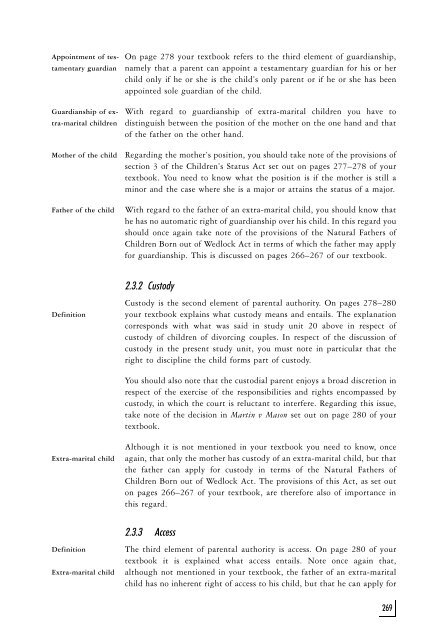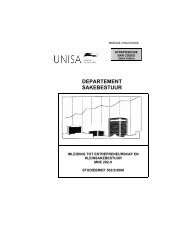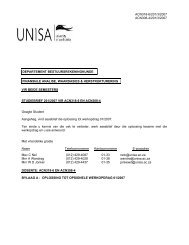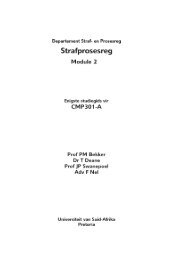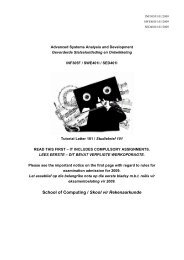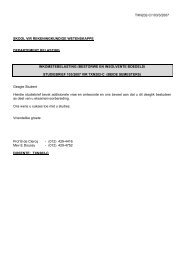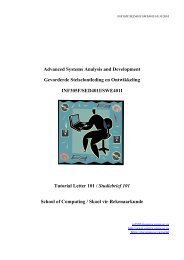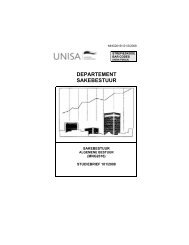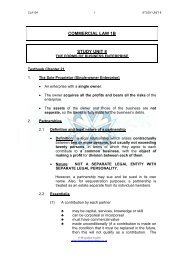key to the study guide - Name
key to the study guide - Name
key to the study guide - Name
Create successful ePaper yourself
Turn your PDF publications into a flip-book with our unique Google optimized e-Paper software.
Appointment of testamentary<br />
guardian<br />
Guardianship of extra-marital<br />
children<br />
On page 278 your textbook refers <strong>to</strong> <strong>the</strong> third element of guardianship,<br />
namely that a parent can appoint a testamentary guardian for his or her<br />
child only if he or she is <strong>the</strong> child's only parent or if he or she has been<br />
appointed sole guardian of <strong>the</strong> child.<br />
With regard <strong>to</strong> guardianship of extra-marital children you have <strong>to</strong><br />
distinguish between <strong>the</strong> position of <strong>the</strong> mo<strong>the</strong>r on <strong>the</strong> one hand and that<br />
of <strong>the</strong> fa<strong>the</strong>r on <strong>the</strong> o<strong>the</strong>r hand.<br />
Mo<strong>the</strong>r of <strong>the</strong> child Regarding <strong>the</strong> mo<strong>the</strong>r's position, you should take note of <strong>the</strong> provisions of<br />
section 3 of <strong>the</strong> Children's Status Act set out on pages 277±278 of your<br />
textbook. You need <strong>to</strong> know what <strong>the</strong> position is if <strong>the</strong> mo<strong>the</strong>r is still a<br />
minor and <strong>the</strong> case where she is a major or attains <strong>the</strong> status of a major.<br />
Fa<strong>the</strong>r of <strong>the</strong> child With regard <strong>to</strong> <strong>the</strong> fa<strong>the</strong>r of an extra-marital child, you should know that<br />
he has no au<strong>to</strong>matic right of guardianship over his child. In this regard you<br />
should once again take note of <strong>the</strong> provisions of <strong>the</strong> Natural Fa<strong>the</strong>rs of<br />
Children Born out of Wedlock Act in terms of which <strong>the</strong> fa<strong>the</strong>r may apply<br />
for guardianship. This is discussed on pages 266±267 of our textbook.<br />
Definition<br />
Extra-marital child<br />
Definition<br />
Extra-marital child<br />
2.3.2 Cus<strong>to</strong>dy<br />
Cus<strong>to</strong>dy is <strong>the</strong> second element of parental authority. On pages 278±280<br />
your textbook explains what cus<strong>to</strong>dy means and entails. The explanation<br />
corresponds with what was said in <strong>study</strong> unit 20 above in respect of<br />
cus<strong>to</strong>dy of children of divorcing couples. In respect of <strong>the</strong> discussion of<br />
cus<strong>to</strong>dy in <strong>the</strong> present <strong>study</strong> unit, you must note in particular that <strong>the</strong><br />
right <strong>to</strong> discipline <strong>the</strong> child forms part of cus<strong>to</strong>dy.<br />
You should also note that <strong>the</strong> cus<strong>to</strong>dial parent enjoys a broad discretion in<br />
respect of <strong>the</strong> exercise of <strong>the</strong> responsibilities and rights encompassed by<br />
cus<strong>to</strong>dy, in which <strong>the</strong> court is reluctant <strong>to</strong> interfere. Regarding this issue,<br />
take note of <strong>the</strong> decision in Martin v Mason set out on page 280 of your<br />
textbook.<br />
Although it is not mentioned in your textbook you need <strong>to</strong> know, once<br />
again, that only <strong>the</strong> mo<strong>the</strong>r has cus<strong>to</strong>dy of an extra-marital child, but that<br />
<strong>the</strong> fa<strong>the</strong>r can apply for cus<strong>to</strong>dy in terms of <strong>the</strong> Natural Fa<strong>the</strong>rs of<br />
Children Born out of Wedlock Act. The provisions of this Act, as set out<br />
on pages 266±267 of your textbook, are <strong>the</strong>refore also of importance in<br />
this regard.<br />
2.3.3 Access<br />
The third element of parental authority is access. On page 280 of your<br />
textbook it is explained what access entails. Note once again that,<br />
although not mentioned in your textbook, <strong>the</strong> fa<strong>the</strong>r of an extra-marital<br />
child has no inherent right of access <strong>to</strong> his child, but that he can apply for<br />
269


